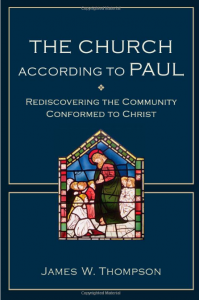Identity enters us from a variety of angles: for some it is some kind of inner self, for others it is one’s vocational passion, for others it is successes — physical, financial, possessions, for others it is one’s social status, for others it is one’s friends, for others it is religious faith, for others one’s sports teams, and I could go on. One could say identity runs between individualism and collectivism: Who I am or Who we are.
What is Christian identity?
James Thompson, in his book The Church According to Paul, examines one of the most important themes in all of Paul’s letters: “in Christ.” This incorporative idea runs right through Paul’s letters and demands that we learn to think “in Christ”-ly if we want to think like Paul.
To be “in Christ” gives rise in Paul to his notion of the church as the “body” of Christ. To be “in Christ” is to be union with him but to be in union with him is to be union with all who are in union with him. Thus, to be “in Christ” is not individualism but a kind of collectivism. But this collectivism is christocentric and christoformity.
Thompson draws the following conclusions(76-77), which I enumerate for easier discussion:
1. Paul’s gentile converts find their identity as members of the people of God with their roots in Israel’s story. Paul transforms the concept of the people of God with his claim that the converts share the destiny of Christ and are now in him.
2. Life in Christ is no private matter. Paul does not speak of a “personal relationship to Jesus Christ” but speaks of the community in Christ. Individuals do not come together in a social contract or to have their needs met. To be “in Christ” is to be in the company of others who come together not only for worship but also to share a common life in congregations that live and proclaim the story of Christ.
3. For Paul, however, the community of believers is not merely a body but the body of Christ. When Paul says that ‘you were baptized into one body” (1 Cor. 12:13), he indicates that the body preceded the individuals. Thus the church is not merely a gathering of individuals, for the whole is greater than the sum of the parts. To be a member is not to be a “card carrier,” in which one pays dues in exchange for the benefits. Those who are “in Christ” share in the destiny of the one who sacrificed himself for others, and they live in harmony with others.
4. Existence in Christ is both inclusive and exclusive. A consistent theme in Paul’s transformation of the election tradition is that in Christ the ethnic and social distinctions have been removed. The church is not a homogeneous group but a community composed of people whom we did not choose. Paul consistently reiterates this theme in the letters. At the same time, existence in Christ has sharp boundaries, for the church is the community that shares the destiny of Christ. Its unity with him in suffering and death is the prelude to union with him in resurrection and new life.






